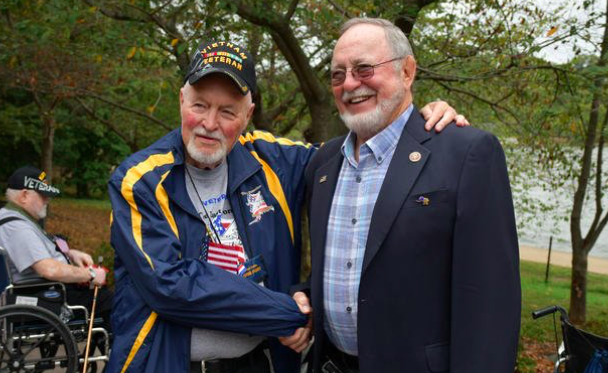By CONGRESSMAN DON YOUNG
Every year on Veterans Day, Americans across the nation wrap themselves in the flag, listen to patriotic music, and thank veterans for their service.
But when the music stops, sadly so do the expressions of gratitude to those who wore the uniform. It is said so frequently in our country that it has almost become cliché, but freedom isn’t free; it has a very real cost.
Throughout our nation’s history, scores of men and women have answered the call to serve so that on November 11th of every year, Americans can enjoy a burger and a cold beer while “God Bless the USA” plays repeatedly. Too often, these holiday activities are enjoyed with little or no reflection on the sacrifices of our veterans. Very frankly, our nation’s veterans deserve to be thanked far more frequently than once a year.
As a veteran who experienced the transition back to civilian life first-hand, the “teach a man to fish” proverb highlights how important it is for our veterans to be equipped with practical skills to help them navigate civilian life. Countless organizations in Alaska and across the U.S. offer tools like resume building, financial education and employment workshops to veterans.
It is my great hope that organizations doing this important work can continue to expand in communities across our country. A 22-year-old veteran has the skills and knowledge to do things a 22-year-old college graduate cannot. They are highly adaptable, know how to improvise, and can overcome challenges based on years operating in some of the most hostile and stressful environments imaginable. These experiences cannot be replicated on college campuses.
As a Congress, we have made great strides in expanding employment opportunities for veterans. The HIRE Vets Act — now signed into law — takes important steps to incentivize businesses to hire and retain veterans.
In addition to veterans’ employment legislation, Congress continues to support veterans employment through its programs. This includes the House of Representatives’Wounded Warrior Fellowship Program and the SFC Sean Cooley and SPC Christopher Horton Congressional Gold Star Family Fellowship Program Act, which was recently passed by the House and would establish a congressional fellowship for Gold Star Families.
However, Congress has not always worked effectively to pass critical veterans legislation. It has taken far too many years to pass Blue Water Navy legislation; we have only recently begun working to eliminate the widow’s tax and have not done enough to combat Burn Pit illnesses that affect Post-9/11 veterans. As a Congress, we can and must do more. America’s veterans aren’t asking for special treatment or carve-outs; they simply want what they have earned and deserve.
At the end of the day, veterans want to know that their service and sacrifice were worth something. Too many of our veterans returned home without their friends and continue to recover from the physical and mental wounds of war. Veterans want to know that the months or even years they spent away from their loved ones was worth it. They want to know that their brothers and sisters in arms they put in the ground died for a reason. They want to know that their sacrifice mattered.
This Veterans Day, I want all veterans — in Alaska and across the country — to know that a grateful nation stands with them.
